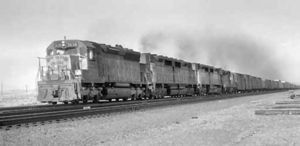EMD DD35
The EMD DD35 was a 5,000 hp (3,700 kW) diesel-electric locomotive of D-D wheel arrangement built by General Motors Electro-Motive Division for the Union Pacific Railroad and Southern Pacific Railroad. In the early 1960s Union Pacific started asking for a 15,000 hp 3-unit locomotive set to replace the turbines then in use. The DD35 was a cabless booster (B unit) locomotive that basically consisted of two GP35 locomotives on a common frame, riding on a pair of long 4-axle Flexicoil trucks. The 4-axle truck was considered too harsh on the track to be in the lead, and thus EMD's response to the UP request was a 4-unit locomotive, consisting of a pair of 2,500 hp GP35s sandwiching a pair of DD35s, to make one 15,000 hp locomotive.
EMD produced a demonstrator set like this in September 1963, painted in striking red and white (similar to the Frisco's livery). It was demonstrated on a number of railroads, but the only interest came from the UP and the Southern Pacific Railroad. The UP bought the entire 4-unit demonstrator set, and followed up with an order for 25 more, which were delivered from May through September 1964. The two demonstrators were numbered 72B and 73B; the 25 production locomotives were assigned 74B through 98B.
Three demonstration units were built for the Southern Pacific, which tested them, kept them, but ordered no more. They were numbered 8400-8402, later 9500-9502 and still later 9900-9902. They saw only light use, being among the first locomotives sidelined whenever there was a downturn in traffic. The SP scrapped them all in the 1970s.
The DD35s were initially quite unreliable; some of this was blamed on sand from the internal sandboxes getting in electrical gear, so new sandboxes were fitted on the walkways in 1969. The DD35s were about the last EMD road units to be built with DC generators and old-fashioned switchgear, which were more troublesome than the later equipment.
Once teething troubles had been overcome, the DD35s were reasonably successful, but they were less flexible than smaller units and thus all of the original B units were withdrawn by 1977 as the railroads fell on harder times. The DD35As survived a little longer, until 1981. There are no survivors of either the DD35 or DD35A models.
References
- Pinkepank, Jerry A. (1973). The Second Diesel Spotter's Guide. Kalmbach Publishing Co., Milwaukee, WI. ISBN 0-89024-026-4.
- Oxlade, John. Union Pacific DD35 and DD35A. Retrieved on January 11, 2005.
- Barris, Wes. Union Pacific Centennials. Retrieved on January 11, 2005.
- Strack, Don http://utahrails.net/webpubs/up-dd35.php
6 and 8-axle diesel-electric locomotives built by EMD | ||
|---|---|---|
| Six-axle road power: | SD7 · SD9 · SD18 · SD24 · SD28 · SD35 · SDP35 · SD38 · SD38AC · SD38-2 · SD39 · SDL39 · SD40 · SD40X · SD40A · SD40-2 · SD40-2W · SD40T-2 · SD40-2S · SDP40 · SD45 · SD45X · SD45-2 · SD45T-2 · SDP45 · SD50 · SD60 · SD70 · SD70M · SD70MAC · SD70M-2 · SD70ACe · SD75M · SD75I · SD80MAC · SD90MAC |  |
| Eight-axle road power: | DD35 · DD35A · DDA40X · DDM45 | |
| See also: List of EMD locomotives | ||

